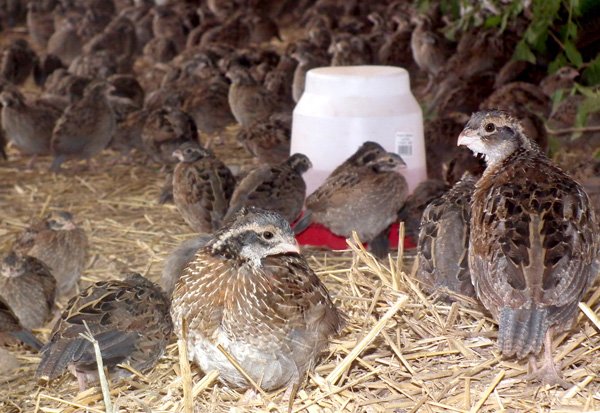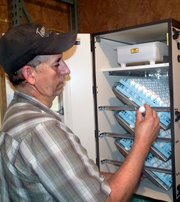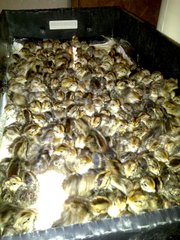DECATUR — Wild quail are becoming a rather rare sight in northwest Arkansas, but in Decatur it's still possible to see a covey of more than 1,500 at Spavinaw Quail and Pheasant, owned by Harold and Gina Holt.
The Holts operated chicken broiler breeder houses for more than 19 years on their Decaturfarm but decided last year to convert their chicken houses to raise northern bobwhite quail and ring-necked pheasant.
The couple remodeled one of the houses to make an ideal home for raising wild game birds. They plan to sell the birds to be used at hunting resorts and bird dog trials.
Harold became interested in game birds through his taxidermy business. Many of his customers brought him birds from their hunts in Kansas and surrounding states, he said.
Instead of pumping out thousands of chicken eggs a week, Harold and Gina now get to see the process through from egg to adult bird. Their first batch of more than 1,500 quail was hatched about five weeks ago, followed by more than 750 pheasants a few weeks later.
“It’s really interesting to see them develop from an egg,” said Holt.
Inside the chicken house, walls have gone up to create rooms and flight pens that suit the needs ofthe smaller birds. Harold spent a lot of time designing the facilities to make an ideal environment for the birds that is also easy and convenient for him to care for.
The hatching room contains two digital incubators that hold several thousand pure-white quail eggs so tiny they look more like Easter candy than the real thing. Quail and pheasant eggs are incubated for 23 to 24 days - compared to21 days for achicken egg, Holt said. The incubators have digital controls to make sure the temperature and humidity stay at the correct level and trays ofeggs automatically tilt from side to side to simulate being turned by a mother bird.
When the babies are ready to break out of their shells, the eggs are moved to hatchers, similar to the incubators, but with trays to keep the birds safe as they break out of their tiny eggs.
Chicks spend their first few weeks in a brood room with red lights hanging from the ceiling to keep them at the correct temperature. As they grow older, they are moved through a set of flip-up-doors into an 85-foot-long flight pen.
On Tuesday, the pen was full of more than 1,500 five-week-old quail. The birds, which already have most of their feathers and can fly amazingly well, have beautiful details and are mesmerizing to watch as they move around the pen. They will be fully mature at 12 weeks of age, Harold said.
Customers prefer birds that develop as many of the natural behaviors of wild quail as possible, so Harold encourages them to fly from one end of the pen to the other several times a day. The birds make an impressive rumble that builds to a roar of flapping wings as they move down the pen.
The quail eat a high-protein game-bird feed, but also love greens and brush. The pen is bedded with straw, which Harold shifts into small mounds, where the birds seem to enjoy gathering.
Harold is working to build an additional 200-foot flight pen spanning the rest of the building. He is planning to line the sides with brush to provide the birds with a natural environment and put feeders and waterers down the open area in the middle.
Captain Brian McKinzie of the Arkansas Game and Fish Commission said, to his knowledge, Spavinaw Quail and Pheasant is the only large-scale game bird farm in northwest Arkansas. There are a few small game-bird farms in the area and some larger farms near Fort Smith and Alma.
Northern bobwhite quail are not as common as they once were in northwest Arkansas, mainly because of loss of habitat due to development, but they can still be found - especially on the westside of the county, McKinzie said. Domestic quail cannot be released into the wild for the purpose of establishing a breeding population because of disease issues, he said. Hunting resorts and private individuals wishing to release a few birds on their property to train their hunting dogs can do so with a special permit and all the birds must be killed. Landowners must submit the proper paperwork and the exact coordinates of their property to qualify for the permit,McKinzie said.
All the domestic quail the Holts - and all other game-bird farmers - raise will be given leg bands before they are sold. It is inevitable that a few birds will escape and could possibly live for quite some time in the wild. Bandingallows them to be tracked, McKinzie explained.
Anyone who is breeding quail to be released or sold, even just a few, is required to have a commercial game-bird license, McKinzie said. The license is only $25 a year and requires the facilities to be inspected by a Game and Fish officer to make sure that birds can't escapeand predators can't get in. McKinzie said Harold's facilities are the best he has seen in his 27-year career.
McKinzie emphasized that if there are any other unlicensed game-bird owners in the area, he would like to help them get the proper licenses. McKinzie said he would rather help game-bird breeders meet all the legal requirements than get them into trouble.
In the future, Harold said he plans to renovate his second chicken house to make room for morepheasant. He also plans to apply for a commercial license and USDA meat stamp so he can sell birds for meat. There are not any USDA inspection requirements because quail are wild birds, but blood tests are required, he said.
Harold said he is grateful for the many hours Gina and their two sons, Kile and Gary, have put in preparing the facilities over the past several months, as well as all the help and advice he has received from McKinzie.
"It's been a lot of fun even though it's been a lot of hard work," Harold said.
News, Pages 8 on 08/17/2011



